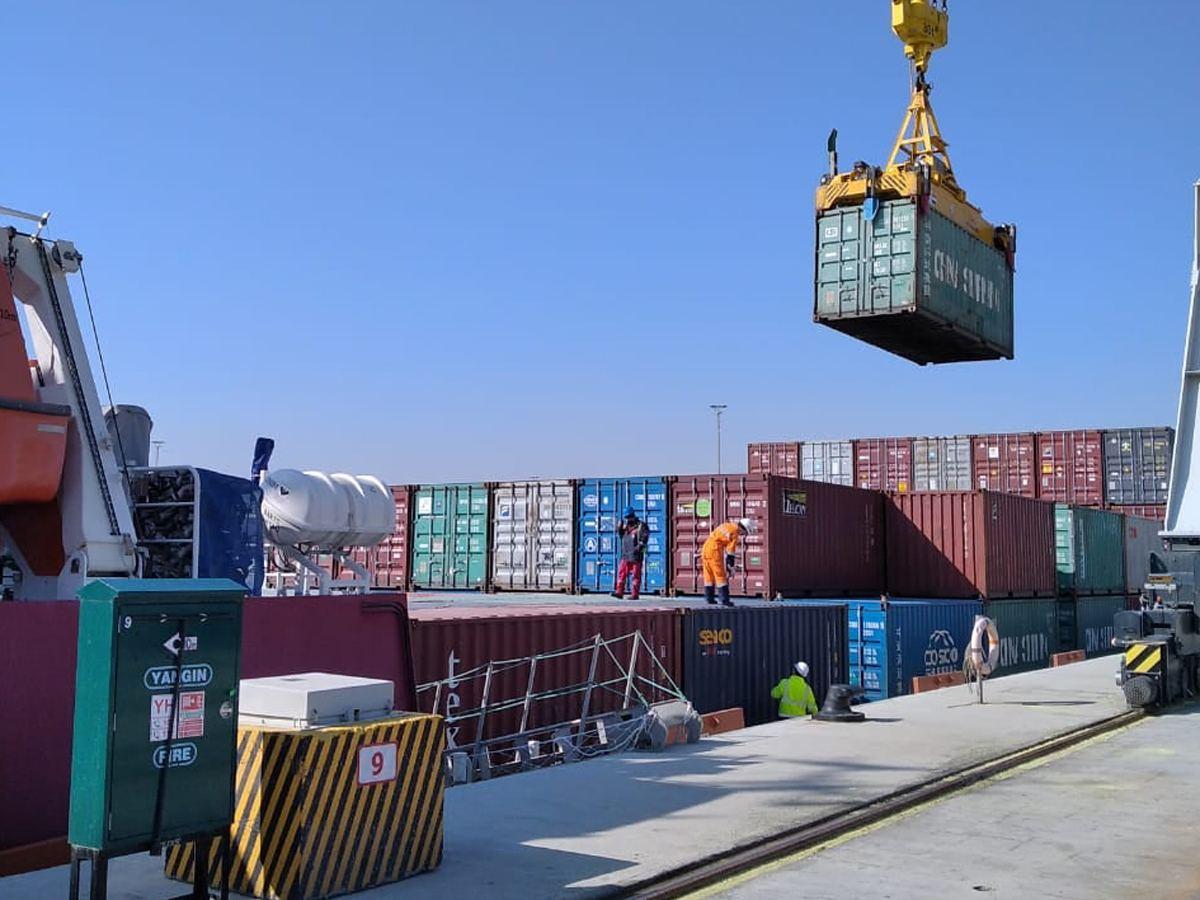Momentum surges as Chinese trucks embark on Azerbaijan's Middle Corridor journey Driving towards success
Over the past two and a half years, the Eurasian market has witnessed a shift in cargo traffic and migration of road transport companies towards the Middle Corridor. Against the background of strengthening anti-Russian sanctions, the work on unification and simplification of cross-border procedures in the Caspian countries has accelerated, including digitalization of systems for control over the movement of road cargo, introduction of unified electronic permits for road transport. Interest in road freight transportation along the Trans-Caspian route is growing rapidly, and following the results of the recent meeting of the Kazakhstan-China joint commission on road transportation held in Aktau, a new project was launched - transit transshipment of cargo by trucks from China to Kazakhstan and further through the ports of Kuryk and Alat to Georgia and the EU.
Tens of millions of cargoes are transported annually in the vast transit transportation market of the Eurasian space, with road transport accounting for about 50 per cent of the total. The war in Ukraine, Western sanctions and other complicated geopolitical processes in the post-Soviet space have brought very serious changes to the traditional transport and transit picture in the region. For the third year in a row, the long-term efforts of the European Commission (EC) have been aimed at shifting international transit away from the Northern Corridor towards alternative routes, the most important of which is considered to be the Middle Corridor. The transit of goods by road along the Middle Corridor is gaining more and more supporters in the European Union: for example, last summer an initiative of the Permanent Secretariat of the Intergovernmental Commission TRACECA was launched, which organized pilot cargo transportation by tractor-trailers with semi-trailers along a multimodal route from Lithuania to Poland and further to Slovakia, Hungary, Romania, Bulgaria, with ferry transshipment via the Black Sea to Georgia, Azerbaijan and further via the Caspian Sea to Kazakhstan.
Recently, similar trends have become dominant in Central Asia (CA) and China. Forwarding companies and trucking companies from these countries are increasingly focused on the Trans-Caspian International Transport Route (TITR), shifting the transit transportation of heavy trucks in the south-western direction to the Caspian ports and further through Azerbaijan and Georgia to the world markets.

Another step in this direction was taken recently: during the meeting of the Kazakh-Chinese joint commission on road transportation held in Aktau, for the first time in recent history, a pilot transit road transportation of cargoes along the TITR route was launched. According to the Ministry of Transport of Kazakhstan, the first three Chinese trucks with 80 tons of cargo, which left the Chinese city of Urumqi on May 23, were loaded on the ferry in the Kazakh port of Kuryk and proceeded to the Baku International Sea Trade Port (BISTP) and will further proceed to Georgia, Türkiye and European countries.
According to Ali Altai, Chairman of the Road Transport and Transport Control Committee of the Kazakh Transport Ministry, the agreement signed last year with the Chinese side on road transportation opens up wide opportunities and prospects for further development of cargo transportation on the international track. "For the first time in history, the trucks of the two countries are given direct access to all major trading cities of the parties, and there is also an opportunity to realize transit cross-border road transportation", - said Altai, implying new opportunities of the China - Kazakhstan - Azerbaijan – Georgia road route.
Until now Chinese cargoes through the TITR have been transported exclusively by container block trains, and if Chinese road carriers successfully enter the Middle Corridor routes, there will be qualitative changes in the transit map of the entire Caspian region. It is quite obvious that together with Kazakhstan, Azerbaijan will become the key beneficiary of road freight transit projects. In particular, already in 2022-2023, road freight transit through Azerbaijan increased by one third, and similar positive trends were observed in January-March 2024. According to the State Statistics Committee, in the first quarter of this year, the transshipment by road transport in the country amounted to 30.418 million tons with an increase of 7.2 per cent. According to the data as of the end of last year, about 54 per cent of the total international traffic, including transit cargo, carried through the territory of Azerbaijan, falls on road transportation.
Further expansion of the trucking track at the Caspian crossing is beneficial for Azerbaijan, which has obvious geographical and logistical advantages. Over the past years, the country has created a network of high-speed highways to the west on the routes of the Middle Corridor, and the port of Alat has capacity terminals for handling wheeled vehicles transported by four RO-RO and RO-PAX vessels on the balance sheet of the Azerbaijan Caspian Shipping Company (ASCO).
All these advantages not only attract international freight forwarding companies and road carriers to Azerbaijan, but, most importantly, contribute to the development of the country’s road transportation companies. According to the data of Azerbaijan International Road Carriers Association (ABADA), 20 years ago about 2,400 vehicles were involved in international transportation by Azerbaijani companies, and at the end of 2023 their number, having increased fivefold, amounted to 11,960 units of heavy vehicles.
According to ABADA data, in 2023, the share of road carriers from Azerbaijan in international markets increased by 9 per cent, at the same time the positions of Azerbaijani road carriers in priority markets are consistently strengthening: for example, last year a memorandum was signed with the Association of International Road Carriers of Russia. Important steps have been taken in the country to increase the transit attractiveness for international carriers: after the abolition of issuing "permit" forms for vehicles registered in foreign countries at state border crossing points, the number of trucks involved in international transportation more than doubled last year.
In general, according to the data of Azerbaijan Land Transport Agency (AYNA), the number of countries with which Azerbaijan carries out international cargo transportation by road has reached 50, including Pakistan and Great Britain in 2024, and an agreement on full-scale road transportation from Turkish ports has also been reached.

And in the future, Azerbaijan and its partners have huge opportunities for the development of road transportation from China, and the Trans-Caspian route has significant advantages in this area. Thus, for the second year already, the TITR member countries (Kazakhstan, Azerbaijan, Georgia and Türkiye), as well as Uzbekistan, which is actively cooperating with them, have been working on the introduction of unified digital mechanisms in the field of logistics and building up multimodal transportation, including through the formation of a single statistical base for cargo transshipment, digitalization of all border crossing procedures, customs control.
The key objective of the partners, actively supported by the European Commission and TRACECA, is the digitalization of multimodal transport corridors in the Caspian region, ensuring contactless, paperless sustainable transport communication by digitizing all transit checkpoints and digitalizing the entire transportation process. It is planned to achieve these objectives along the entire corridor through the implementation of the draft Global Transit Document (GTrD) Concept, a universal solution based on blockchain technology, which was presented back in June 2021.
The introduction of such digital mechanisms is most needed to optimize the work of transit road transport, and soon the countries participating in the TITR route and their partners will introduce unified electronic permits for road transport. In particular, since March 1, 2024, Azerbaijan has introduced the electronic service of drawing up an electronic consignment note and an electronic waybill with the use of electronic signature tools: so far, this mechanism has been applied to domestic road transport of goods.
Mass introduction of similar mechanisms at the regional level is on the way. Baku, Astana and Tbilisi are actively promoting this plan, while Uzbekistan and Türkiye are in the process of introducing the E-PERMIT electronic system and the E-TIR electronic book with countries as Kazakhstan, Kyrgyzstan and Tajikistan. And in December 2022, the first road freight transportation by road through the E-TIR system between Uzbekistan and Azerbaijan was launched.








